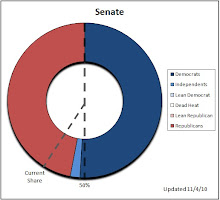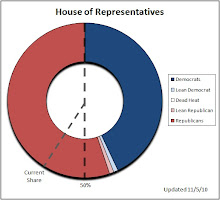I had a long discussion with a coworker the other night. We started talking politics. It started out as well as can be expected between two people who disagree significantly on nearly every major political issue. Once the discussion turned to the issue of homosexual marriage, though, it got ugly pretty quickly. There are many issues like that in politics today. Abortion, gun control, the death penalty, they are all particularly divisive. It's not that the issues themselves are particularly divisive, people just don't know how to handle those who disagree with their deeply held moral convictions. The debates always end up becoming slugfests between people who feel somehow personally insulted that their beliefs can be questioned. So, I started to think about it... what we need is a renewed sense of compromise. Compromise was one of the central elements of the rise of our nation. From James Madison's dealings at the Constitutional Convention to Henry Clay's statesmanship holding our Congress together for decades on end, compromise is essential to our democracy. The real problem is that people have forgotten what compromise is. Compromise is not abandoning convictions for the sake of getting something done. Compromise is breaking down the issue positions into the smaller elements they consist of and finding a way to work the puzzle together. Think of it as a puzzle. As it is, when we speak of issues like those I listed early, we actually have already put the puzzle together, partially, in our own minds. We must then, when we attempt to find a solution with others, attempt to work together odd conglomerations of pieces. Compromise is taking those pieces and breaking them down until a better solution can be found.
So that's my theoretical concept, but how does it apply practically? I would like to take a second look at the issue of homosexual marriage and homosexual rights in this sense of compromise.
Homosexual rights is actually a vast grouping of individual issues. I will attempt to list a comprehensive list of the primary issues here and then find solutions to those individual issues that meet the convictions of those on both sides.
Tax benefits - This encompasses tax credits for married couples and the tax penalties for transfers of wealth and assets that married couples are not responsible for.
My take: The government shouldn't be in the business of subsidizing marriage anyway. We should eliminate this distinction entirely, preferably be extending the same tax credits to all. We should also not penalize transfers of wealth and assets, especially between individuals. If we are going to insist on continuing that policy, though, then I would propose, as a compomise, that all people be allowed to select a certain number of people to be considered friend or family and not subject to such penalties.
Insurance benefits - Many insurance policies extend coverage to spouses.
My take: When it comes down to it, this has to be between the individual and the insurer. It is not the government's place to dictate what businesses should be willing to do. I am no expert on the insurance business, but I am sure that this issue will simply come down to whether or not the demand for same-sex insurance benefits exceeds the willingness of people to pay the increased premiums required to cover it.
Social Security benefits - Social Security benefits are sometimes available to spouses of the deceased.
My take: It is a shame that a person who is not married at all could lose the benefits they have earned through social security. So long as social security exists, a person should be able to designate someone who will inherit their social security benefits just as they would be able to hand down their own assets in a will, be that person their best friend, a partner, or a complete stranger.
Immigration - Marriage can allow for an immigrant to become a citizen.
My take: This is a difficult one to find compromise on. Immigration itself is a charged issue so this one is doubly hard to break down. In the end, I believe the solution can be found in simplifying the process to become a citizen so that getting married is not a requirement for any person to become a citizen of the United States.
Veterans' and military benefits - This includes pensions, healthcare, and military burials only available to spouses of military veterans.
My take: Similarly to Social Security benefits, I believe the best solution would be to allow for veterans to select those who will inherit the benefits they have earned.
Military service
My take: I don't see any reason why homosexual people themselves shouldn't be welcomed into military service.
Adoption
My take: This is the issue that will be impossible to resolve. When it comes down to it, those who support homosexual rights generally believe that it is beneficial for children to be raised in those households. Those who are generally opposed believe that it is severely detrimental to those children. This is simply an issue with no middle ground and it will come down to the judgment of the masses.
Marriage
My take: This is similar to adoption in that it really can't be boiled down much more, but there is a bit of a distinction. Marriage itself is and has always been a religious institution. Even the most ardent advocates of homosexual rights tend to shy away from demanding marriage itself, but rely instead on arguing for civil unions because of the issues I have already discussed.
So, in conclusion...
I believe that compromise can still work. I believe that, if the American people were presented with an all-encompassing bill proposing policies such as what I suggest here that satisfy many of the demands of those on both sides of the aisle, they would support it. I believe this is how we must face all of the polarizing issues of our day.




Applying common sense to politics...





